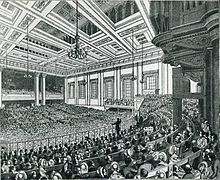Anti-Corn Law League
The Anti-Corn Law League (dt. Antigetreidezollliga ) was an association in England, which sought and also brought about the abolition of the grain tariffs .
These tariffs, which had already been introduced in the 17th century, were changed in 1815 so that imports were forbidden at all if the price was below 80 shillings for 1 quarter , but that they should be duty-free as soon as the price exceeded this rate.
In 1828 this system was replaced by a movable tariff scale, the rates of which decreased as prices rose and vice versa. The Anti-Corn Law League was founded in Manchester in October 1831 by Richard Cobden and several manufacturers and merchants. It was not until 1838 that it gained greater influence, which in 1839, under the leadership of Cobden, Bright , Bowring , Prentice, Thompson, Ashworth, among others, was spread across the country through the establishment of branch associations, the formation of larger funds, holding meetings, etc.
After MP Charles Pelham Villiers ' motion to repeal the Grain Acts in 1839 had failed in the House of Commons , it was possible in 1841 to get Cobden and a few like-minded people into Parliament, where Villiers' motion, which had already stood, already had 40 votes. After the resignation of the Whig Cabinet and the establishment of the Tory Ministry in the summer of 1841, the entire dissenting clergy, the Irish Party and part of the Whigs, who were inclined to free trade, joined the League, while the latter was fiercely opposed by the basic aristocracy and Chartism .
When in 1842 the grain tariffs were modified with only minor reductions, the agitation was pursued with even greater energy. From 1843 to 1845, the League held more than 200 large gatherings and distributed hundreds of thousands of pamphlets in the interests of free trade. Their expenditures in 1844 amounted to 60,000, their cash funds to 26,665 ₤ (pound sterling).
In the parliamentary session from 1844 to 1845 Villier's motion already received 122, another from Cobden's request for examination of the Corn Laws received 221 votes. The League therefore used its utmost powers in the course of 1845 to secure a majority in parliament. Finally, in January 1846 , Robert Peel brought his famous proposal to the House of Commons, according to which the importation of all foodstuffs should be released and a low sliding scale for grain imports should only be maintained for three years for the time being. This Bill went through in the House of Commons and in the House of Lords and became law. The purpose of the League was thus achieved; it dissolved in 1849, when the tariff, which was subsequently completely repealed, had already been reduced to 1 shilling for 1 quarter.
Left
- Frédéric Bastiat: Cobden and the league . Numerous writings of the Anti-Cornlaw League were translated into French by the contemporary French economist Frédéric Bastiat , who began the book with a detailed introduction to the historical significance of the league.
literature
- Archibald Prentice: History of the Anti-cornlaw-league . (London 1853, 2 vols.). 2nd ed. With a new introd. by WH Chaloner. London: Cass, 1968.
- Franz Simonson: Richard Cobden and the Antikornzolliga, as well as their significance for the economic conditions of the German Empire . Berlin, 1883.
- Norman McCord: The Anti-Corn Law League 1838--1846 . London: Allen & Unwin, 1958. Reprinted, Aldershot: Gregg Revivals, 1993.
- Archibald Philipp Primrose (Earl of Rosebery): Lord Rosebery's Speech on the Anti-Corn Law League and Free Trade, Manchester 1897 . London: Cobden Club, 1898.
- Paul A. Pickering and Alex Tyrrell: The people's bread, a history of the Anti-Corn Law League . London [u. a.]: Leicester University Press, 2000. ISBN 0-7185-0218-3 .
- Cheryl Schonhardt-Bailey, From the Corn Laws to Free Trade: interests, ideas, and institutions in historical perspective , Cambridge, Mass .; London: The MIT Press, 2006. ISBN 0-262-19543-7 .
